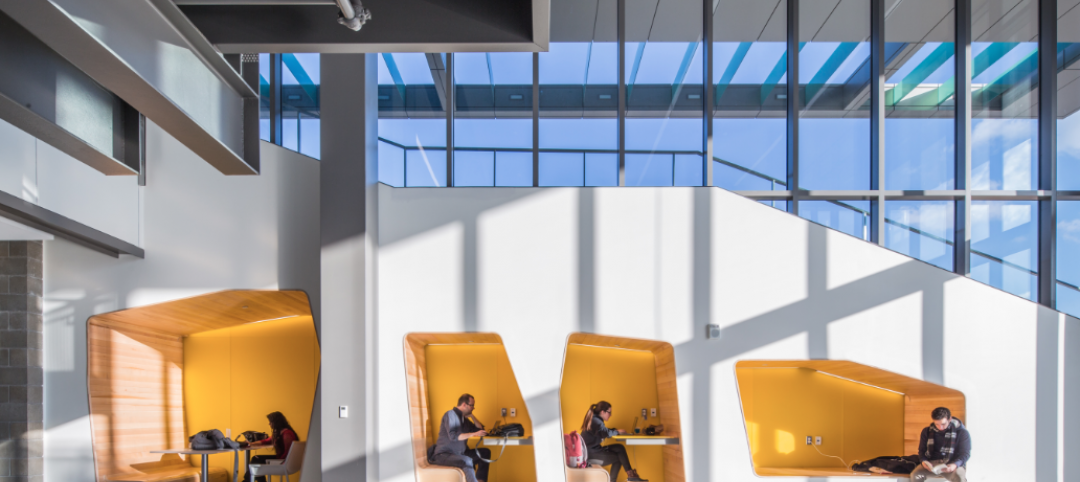The American Institute of Architects (AIA) and the Architects Foundation announced the signing of a memorandum of understanding with architecture firm HOK under which HOK will facilitate focus group activities in partnership with the AIA’s Design and Health Research Consortium, which works to advance university-led research in the area of design and health.
Under the agreement, the AIA and HOK will work with the consortium on its key priority: identifying and developing practice-focused opportunities for funded research, publications and tools in the area of design and public health.
The goal of the collaboration is to help members conduct research that can be translated into practice by architects and be beneficial to people.
“HOK is a bridge to the client community,” said Suzanna Kelley, FAIA, AIA’s Managing Director of Strategic Alliances and Initiatives. “This first collaboration with the private sector is designed to inform consortium members what their ultimate client – the public – needs from their groundbreaking basic research into how design can help improve public well-being.”
The new partnership will leverage HOK’s global network of architects and clients to support translation of existing research—and build the case for more practice-focused research going forward. Findings from the focus groups will be documented and used to help the Consortium universities direct their health research towards a more targeted, client-based approach. The goal of this new partnership is to help Consortium teams further understand how research can be used in architectural practice, and to further the conversation with the Consortium’s public health partners. Focus groups will occur for the next year, concluding in May of 2017.
“We look forward to facilitating focus groups for these institutions and our multidisciplinary design partners in architecture, interiors, landscape, planning and engineering—as well as our clients—in the effort to focus the next generation of research on this important issue,” said Anica Landreneau, Associate AIA, LEED AP, HOK’s director of sustainable design. “HOK and the AIA seek to promote the understanding and application of critical ideas, research outcomes and evidence that sustainable design truly will improve human health and wellness, in addition to ecological health.”
The focus groups will occur at or near the Consortium universities (full list can be found here). These meetings will document the findings of these important conversations. The partnership with HOK provides the AIA and the Foundation with a unique opportunity to engage a respected architectural firm with significant reach on a domestic and global scale. It also helps the AIA fulfill its primary mission of facilitating holistic, synchronous and multi-scale solutions that can empower its members to address a wide range of areas connecting design and public health.
The memorandum of understanding calls for the parties to document and summarize focus group feedback for a broader audience, including the Association of Collegiate Schools of Architecture (ACSA), Association of Schools and Programs of Public Health ASPPH the Consortium Network and participants. The agreement also calls for establishing a process for providing AIA Continuing Education for architect members at each focus group event.
Related Stories
Architects | Aug 17, 2015
Historic power plant converted to modern offices in Minnesota
A landmark power plant in Owatonna, Minn., damaged in a 2010 flood has new life as the headquarters of Owatonna Public Utilities following a renovation by architects Leo A. Daly.
High-rise Construction | Aug 11, 2015
Calatrava's Turning Torso wins CTBUH's 10 Year Award
The 623-foot, 57-story tower was the world's first twisting skyscraper. Completed in 2005, the building, designed by Santiago Calatrava, rotates 90 degrees along its height.
Architects | Aug 11, 2015
Architecture firm compensation trending upwards
Latest AIA compensation survey finds average compensation for staff positions up 3.5 percent from early 2013
Architects | Aug 11, 2015
12 architecture schools join NCARB's 'speedy path to licensure' program
For architecture students, a license to practice may soon be available as early as graduation day
Architects | Aug 10, 2015
HDR expands its Canadian presence through merger with CEI Architecture
Public-private partnerships are expected to be one of the combined entity’s strengths.
Retail Centers | Aug 10, 2015
Walgreens’ flagship in Hawaii harkens back to the island’s fishing culture
A house where canoes were made served as the model for this drug superstore’s design.
Giants 400 | Aug 7, 2015
GOVERNMENT SECTOR GIANTS: Public sector spending even more cautiously on buildings
AEC firms that do government work say their public-sector clients have been going smaller to save money on construction projects, according to BD+C's 2015 Giants 300 report.
Giants 400 | Aug 7, 2015
K-12 SCHOOL SECTOR GIANTS: To succeed, school design must replicate real-world environments
Whether new or reconstructed, schools must meet new demands that emanate from the real world and rapidly adapt to different instructional and learning modes, according to BD+C's 2015 Giants 300 report.
Giants 400 | Aug 7, 2015
MULTIFAMILY AEC GIANTS: Slowdown prompts developers to ask: Will the luxury rentals boom hold?
For the last three years, rental apartments have occupied the hot corner in residential construction, as younger people gravitated toward renting to be closer to urban centers and jobs. But at around 360,000 annual starts, multifamily might be peaking, according to BD+C's 2015 Giants 300 report.
Giants 400 | Aug 7, 2015
UNIVERSITY SECTOR GIANTS: Collaboration, creativity, technology—hallmarks of today’s campus facilities
At a time when competition for the cream of the student/faculty crop is intensifying, colleges and universities must recognize that students and parents are coming to expect an education environment that foments collaboration, according to BD+C's 2015 Giants 300 report.

















